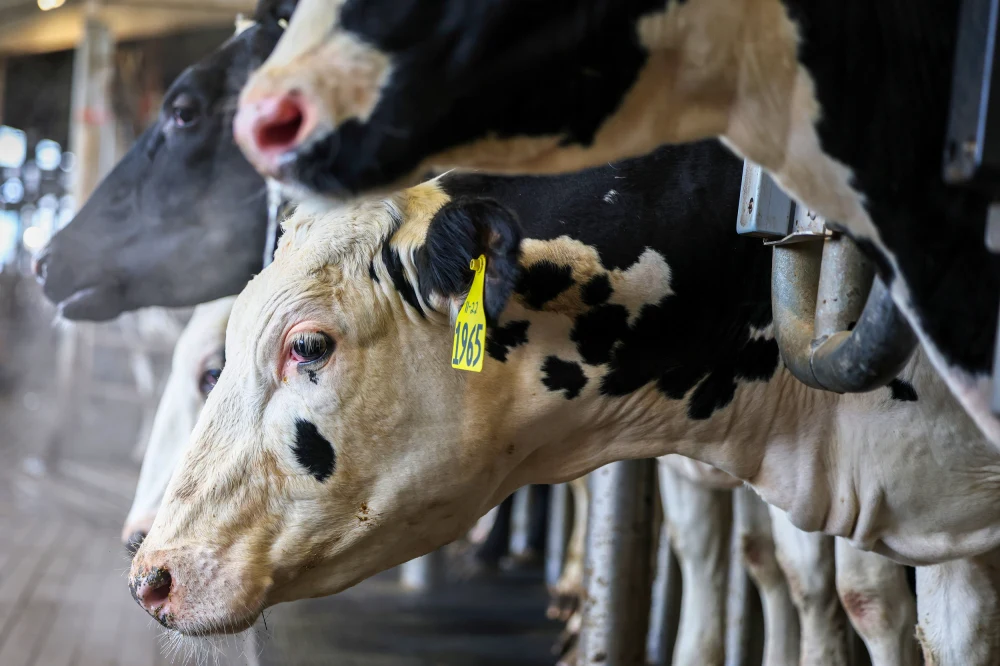Officials are monitoring the outbreak but say a vaccine isn’t yet warranted because the virus isn’t spreading among people or causing severe illness.
Biden administration officials said Wednesday they have no current plans to authorize a stockpiled bird flu vaccine, despite an escalating outbreak among livestock in the U.S. and at least 58 human infections across seven states.
The move means any decisions about a bird flu vaccine will likely be left to health officials in the incoming Trump administration, who may be led by anti-vaccine activist Robert F. Kennedy Jr., whom Trump has picked to lead the Department of Health and Human Services.
The virus has been spreading in dairy cows since the spring and had infected at least 774 herds in 16 states as of Wednesday, according to the Centers for Disease Control and Prevention. Last Friday, the Agriculture Department stepped up its response to the outbreak, issuing a federal order mandating testing of the national milk supply.
The USDA said the testing, set to begin next week in six states, will give farmworkers better confidence in the safety of their animals and their ability to protect themselves from infection, as well as give officials a better sense of where herds are infected.
The virus’s spread in mammals that have close contact with humans is concerning for public health experts, because it gives the bird flu many opportunities to jump to people and potentially mutate to spread effectively from person to person.
Almost all bird flu cases in the U.S. have been in farmworkers who have had contact with infected animals — either dairy cows or poultry — aside from a patient in Missouri and a child in California. A teen in Canada who got very sick and was hospitalized also had no clear contact with infected animals.
The federal government has two bird flu vaccine candidates available in limited quantities in the nation’s stockpile, though they need to be authorized by the Food and Drug Administration before they can be used.
In May, health officials said the government would begin looking at vaccination if the virus mutated in ways that would make existing antivirals like Tamiflu less effective, or if it appeared it was causing serious illness in people.
Dr. Nirav Shah, the CDC’s principal deputy director, said Wednesday that the criteria for deploying a vaccine remains the same.
- “When we think about respiratory vaccines, their sweet spot is really in preventing severe disease and death,” Shah said. “When we look at what is currently unfolding with H5, even in the human cases, thankfully what we’ve seen thus far is mild disease,” he said, using a shorthand for the strain of the influenza virus causing the bird flu outbreak.
“That is not a guarantee, and that could change, but that is one of the things that we are on the lookout for because the vaccine would be maximally effective against reducing severity of disease,” Shah said. While the administration isn’t considering a vaccine today, that could change if the outbreak changes, he said.
Still, some public health experts believe the time for vaccination is now, particularly for farmworkers.
“I do not think we should gamble with farmworkers’ lives by waiting for them to be hospitalized or die before using the tools we have to protect them,” said Jennifer Nuzzo, director of the Pandemic Center at Brown University School of Public Health.
A balancing act
Whether to authorize or deploy a vaccine is a constant balancing act for public health agencies, Shah said, noting that even the safest vaccine can come with side effects.
In 1976, at the first signs of an H1N1 swine flu outbreak in the U.S., public health officials quickly initiated a nationwide vaccine campaign. The shot, however, caused a small increased risk of Guillain-Barre syndrome, a rare condition that causes the immune system to attack healthy nerve cells.
The outbreak never spread widely, but it set public trust in the flu shot back decades.
“It led to an analysis and introspection about whether the response to those 13 cases of swine flu had been an overreaction,” Shah said. “And, indeed, there was a high degree of vaccine skepticism that emerged.”








